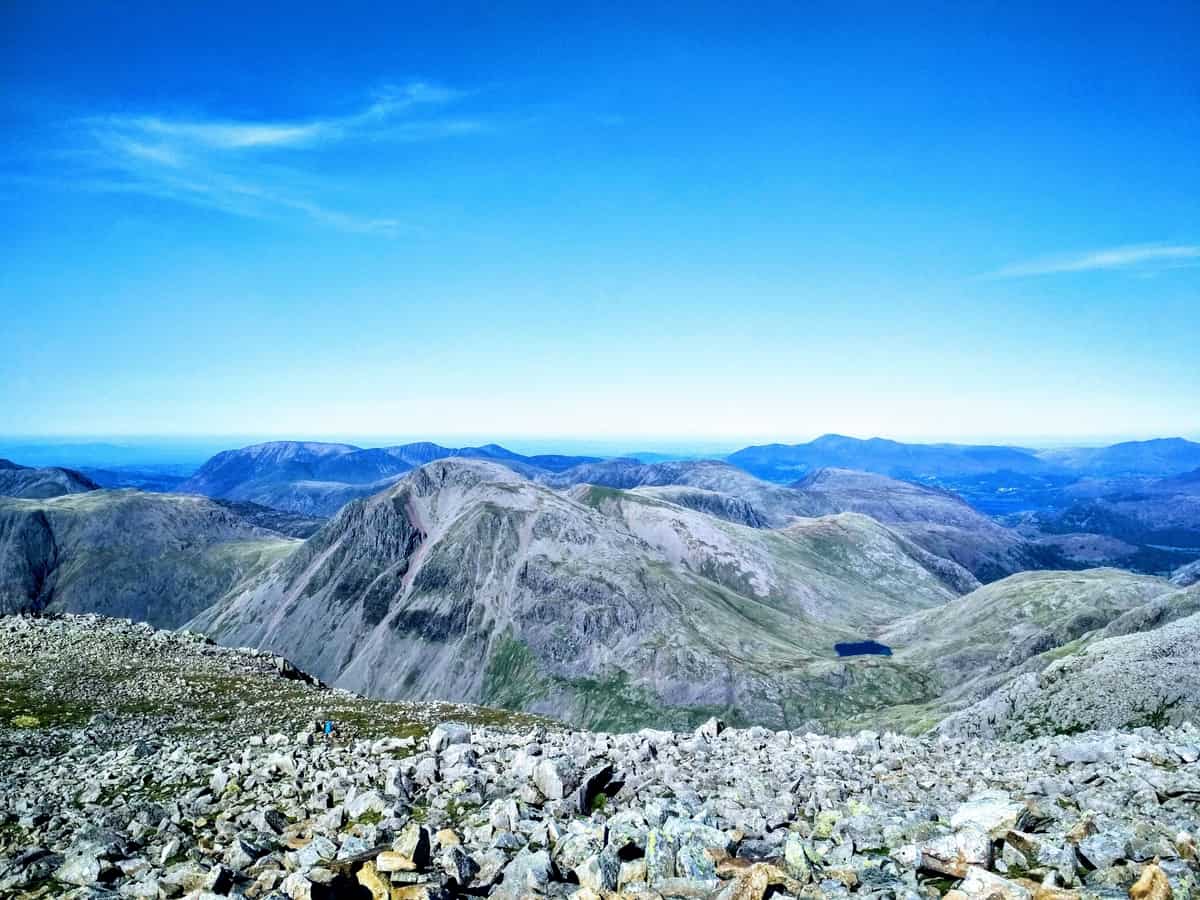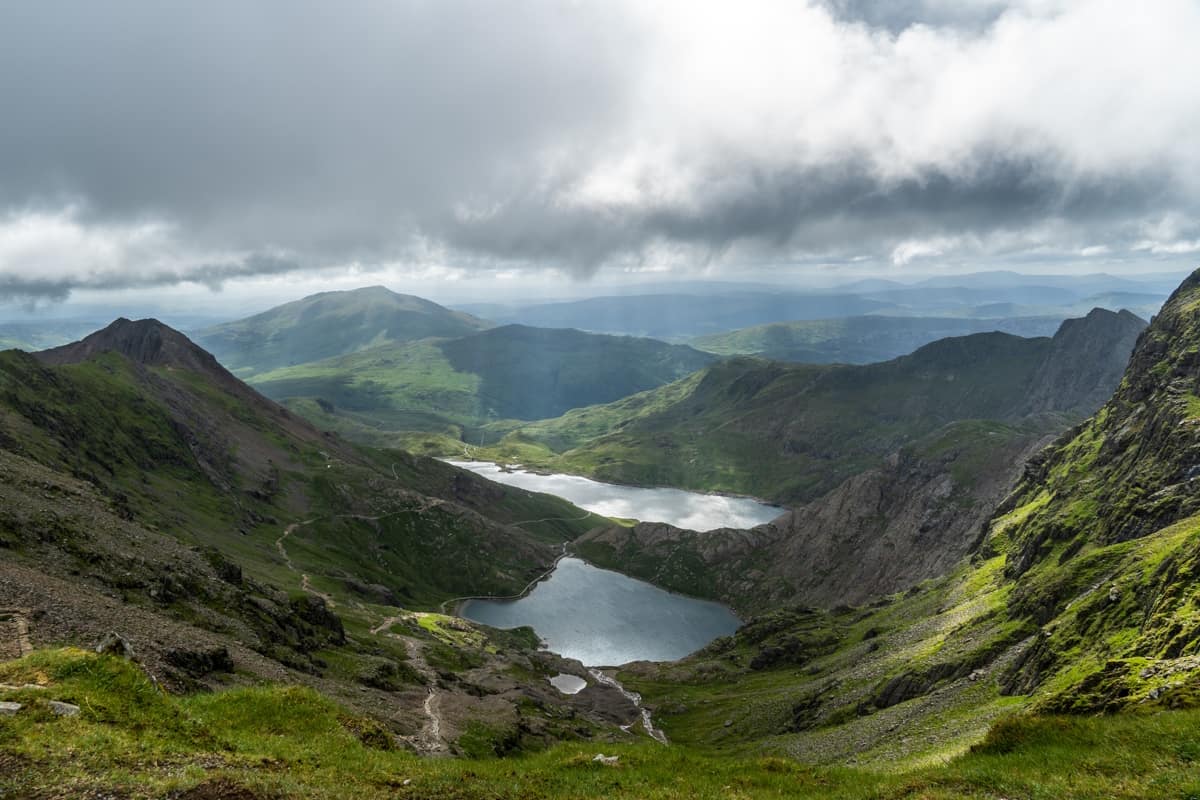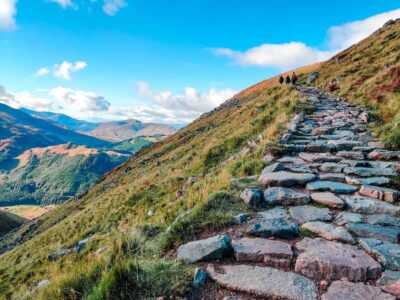Here in the UK, we’re fond of a challenge that pushes us to our limits while raising money for charity. Some choose to run a marathon, while others swim the Channel. The common thread is that the more extreme the event, the better. No one would dispute that the Three Peaks Challenge meets this criterion—and then some.
For the unfamiliar, the Three Peaks Challenge consists of climbing the highest peaks in the three countries on the island of Great Britain: England, Scotland and Wales. Making things even tougher is the imposition of a 24-hour time limit in which to climb and descend all three. It’s not too difficult to see why this challenge might be particularly difficult for those of us with acrophobia!
In this post, we’ll discuss whether you should take on the Three Peaks Challenge with a fear of heights. We’ll also provide some useful tips on how to prepare for a rigorous day of climbing.
What is the Three Peaks Challenge?
As we discussed in our introduction, those taking part in the Three Peaks Challenge must climb three mountains in the space of 24 hours. The ‘Three Peaks’ in question are:
- Ben Nevis, the highest mountain in Scotland (and the UK as a whole): 1,345 m/4,413 ft
- Scafell Pike, the highest mountain in England: 978 m/3,209 ft
- Snowdon/Yr Wyddfa, the highest mountain in Wales: 1,085 m/3,560 ft
Tot up the heights of the three mountains, and you’ll find that there’s a total ascent of just over 3.4 kilometres (or 2.1 miles). This is only one part of the story, though. It’s estimated that the challenge also involves 37 kilometres (23 miles) of hiking, plus a whopping 462 miles of driving.
The last element of this is what makes it so fiendish. After all, the drive alone between Ben Nevis, Scafell Pike and Snowdon can take around 10 hours. This would leave you with less than five hours apiece to complete each of the peaks. And don’t forget, you officially complete the challenge only once you’ve both ascended and descended all three.
Taken on their own, the climb up each of these mountains is considered to be strenuous, but doable for a person in good shape. However, doing all three in one day makes things much tougher, not least because you might not get much sleep while on the road between the mountains.
If the idea of doing all of this in one 24-hour stretch is a bit too much for you, though, then don’t worry. While 90% of the estimated 30,000 walkers who take on the Three Peaks Challenge every year finish, only 40% do so in one day. Another popular option is to spread things out over three days.
The route above is more formally known as the National Three Peaks Challenge. When someone refers to the ‘Three Peaks Challenge’, this is the one they’re likely to be talking about. However, there are similar challenges that involve reaching summits in Yorkshire, Wales and Surrey respectively. There’s even a Five Peaks Challenge that adds Northern Ireland’s Slieve Donard and the Republic of Ireland’s Carrauntoohil!
Why would you do the Three Peaks Challenge with a fear of heights?

This blog is all about living with acrophobia, so it’s time for us to approach things from the Climb Above Fear point of view. If you have this phobia, you might wonder why you would even consider taking on the challenge. However, there are a number of reasons why you might still choose to tackle the Three Peaks Challenge with a fear of heights.
The first reason is to fundraise for a chosen charity. From medical research to community projects, there are plenty of deserving causes that you may choose to put your name to. Doing so will not only help to provide these organisations with the cash they need to keep going, but also gives them an awareness boost amongst friends, colleagues and loved ones. This means that your one-off challenge could have long-lasting positive effects for your charity.
Meanwhile, if you’re walking as part of a team, there are plenty of factors that could be motivating you. Perhaps you’re taking on the challenge together with family members or friends in memory of a loved one, for example. Alternatively, you might be doing it with work colleagues as part of a bonding exercise.
Another possibility (and our personal favourite!) is the chance to overcome your own fears. What better way to conquer your phobia than to climb to the highest points in England, Scotland and Wales? Making this even sweeter will be the sense of accomplishment you feel, as well as the myriad of mental and physical health benefits you’ll gain. The prospect of some beautiful scenery is a nice cherry on top!
Are there any reasons not to do this challenge?
Here at Climb Above Fear, we’re big advocates of facing your fears and love helping people to reach heights that they previously didn’t think were possible. However, there are some circumstances in which the Three Peaks Challenge might not be suitable for you.
- If you have a pre-existing health condition, or are over the age of 65, be sure to check with your GP before you sign up. They’ll let you know whether you’re in the right shape to take on what is a very demanding physical test.
- Similarly, according to the official Three Peaks Challenge website, it is not advisable to attempt to complete the course while pregnant.
- While there are plenty of stories of people successfully completing the challenge with a fear of heights, it might not be suitable if you suffer from extreme acrophobia. This is because it’s possible that your acrophobia could cause you to experience a panic attack, putting you, and potentially those around you, in danger.
If you feel your fear of heights is severe enough to cause you problems during this or similar hikes, then Climb Above Fear can help. We have a range of useful articles in the travel and hobbies section of our blog, including guidance relating to rock climbing and climbing a via ferrata. If you’d like more personalised support, consider one of our therapy packages specifically designed for people with acrophobia.
Preparing for the Three Peaks Challenge

Physical training
It should go without saying that any kind of physical challenge of this type will require plenty of preparation to ensure that you’re in the right shape. Doing so will allow you to hike all three mountains safely and successfully.
Regular hill-walkers will likely already be in the right physical condition, and as such will need less training beforehand. Many of the people taking on the Three Peaks Challenge, however, will be amateurs. If this sounds like you, prepare to put in a few months of work to prepare yourself.
While the exact training regimen will vary from person to person, you’ll need to consider aspects such as your cardiovascular endurance and building strength in your legs, core and upper body. Much of this can be done in the gym or even at home, but be sure to also get outdoors and hike—there really is no substitute for it!
Looking for guides to get you started? Consider the training plans compiled by the Three Peaks Challenge, The Walking Northerners and PureGym.
Mental preparation
In addition to the physical training detailed above, those of us with acrophobia will need to add in extra steps to make sure that we’re mentally ready. Below, we’ll list some top tips on getting your mind mountain-fit.
- Identify the source of your fear. It’s easy to let your emotions overwhelm you in the moment, but you can help to defuse these feelings by working out what’s causing them. It might be anything from a steep gradient to a feeling of dizziness. Once you know what’s at the root of your fear, you can rationally think things through and be aware that the risk isn’t as great as you feared.
- Try some breathing exercises. These can help to lower your heart rate, reduce stress, and distract you from anxious thoughts. For example, you could try alternating between nostrils, breathing in through one and out through the other. Alternatively, there’s 4-7-8 breathing: inhaling for four seconds, holding for seven, and exhaling for eight. Try this guide from VeryWellMind for more.
- Don’t sweat the small stuff. It can be tempting to get wrapped up in every small error that you make. One small slip, and you can spiral off into catastrophic thinking, worried that you’re about to lose your footing with every step. The reality is that you’re not going to be perfect—and that’s okay! Acknowledge and accept your mistake, then commit to learning from it and moving on.
- Be positive! The Three Peaks Challenge is no mean feat, and yet we often berate ourselves rather than celebrating our achievements. So, big yourself up—either out loud or in your head. A simple “You’ve got this!” or “You’re doing so well. Keep it up!” can help to change both your thoughts and feelings.
- Visualise yourself achieving your goal. There will be times when you’re feeling fed up, worn out, sore, or just plain over it. In these moments, the path ahead can seem endless. This is where visualisation can help. Imagining yourself at the summit can remind you that there is a final destination, and focus your mind on the sense of achievement you’ll feel when you get there.
- Remember what’s motivating you. As we’ve mentioned earlier in this post, there are plenty of reasons why you might be doing the Three Peaks Challenge in the first place, from fundraising to personal goals. Reminding yourself of this can help you to find the extra reserves in your tank when you’re at a low point and keep you going until the finish line.
Three Peaks Challenge with a fear of heights: Summary
Whether you complete it in 24 hours or spread it out over a longer period, the Three Peaks Challenge is tough. However, with the right mental and physical preparation, you can stop your fear of heights from holding you back.
If your acrophobia is mild or moderate, then the self-help techniques we’ve detailed here should stand you in good stead to complete the hike. People with a more severe phobia of heights should consider therapies such as CBT before they attempt the Three Peaks. For more details, visit the Climb Above Fear homepage to learn more about the packages we offer.



